Historically Black Colleges and Universities Consortium
The Historically Black Colleges and Universities Consortium (HBCUC) ECWTP aims to improve the quality of life for residents in disadvantaged, vulnerable communities by increasing employment possibilities. Robert Bullard, Ph.D., and Beverly Wright, Ph.D. co-lead and direct the Consortium’s activities.
Target Populations: The HBCUC ECWTP serves unemployed and underserved communities in New Orleans, Louisiana; Houston, Texas; Pensacola, Florida; and Detroit, Michigan.
Training Strategy: The HBCUC ECWTP training strategy is designed to increase the number of disadvantaged and underrepresented minority workers in the environmental remediation, construction and other emerging fields, thereby increasing sustainable employment opportunities in the community. The added value of this program is that it promotes economic development, addresses health disparities, and advances environmental justice.
Impact: Since 1995, the HBCUC has trained more than 2,000 individuals.
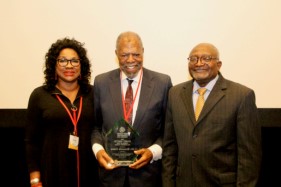
The HBCUC has a rich history advocating for those in need from environmental justice communities. Throughout the past two decades, the Consortium has expanded its capacity to respond to the needs of underserved and disadvantaged communities, primarily those in the South, and particularly the Gulf Coast. Many of the communities in this region face poverty and chronic health disparities, along with limited access to training and education.
The HBCUC ECWTP provides a way for individuals to combat these inequalities through education, quality training, and good paying jobs. Ultimately, the program gives individuals an opportunity to change their lives for the better, as well as their families.
In addition to health and safety training, the ECWTP provides life skills training and counseling services for trainees. “It is more than a training program,” said Deborah Robinson, program manager for the HBCUC ECWTP. “For most of our trainees, it is an opportunity to get a leg up – a chance that they never had. Our program is a lifeline to the community.”
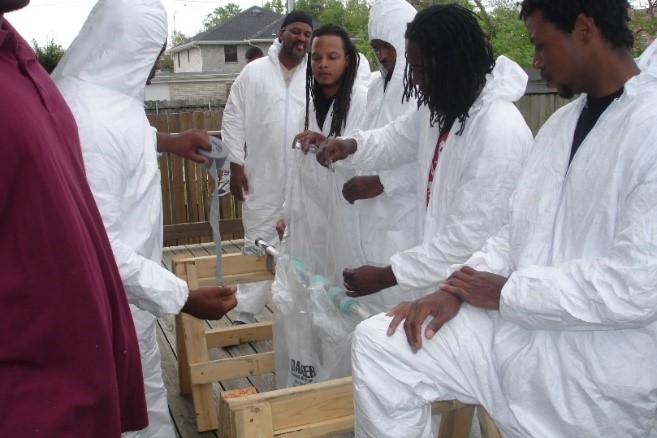
The HBCUC first started as a collaboration between Clark Atlanta and Xavier University under the Minority Worker Training Program in 1995. In earlier years, the HBCUC relied on different unions to conduct training, but this changed when the Consortium established its own training center. This independence made a big difference, giving the Consortium the ability to do training in-house and expand its reach to target communities in the South and Gulf Coast, as well as in Detroit.
Today, the Consortium’s training direction and activities are jointly managed by Texas Southern University in Houston and the Deep South Center for Environmental Justice (DSCEJ) in New Orleans. Co-directors Bullard and Wright work with Robinson, Bruce McClue, ECWTP training manager, other staff, and Consortium members to build partnerships that will enhance the Consortium’s reach and training outcomes.
The Consortium’s reach and success is made possible through partnerships with historically black colleges and universities (HBCUs), as well as non-profit and community organizations. For example, the Pensacola ECWTP is managed by Unity in the Family Ministry, whose mission is to work with underserved communities by providing assistance in social justice, economic development and job training. The Detroit ECWTP is managed by Green Door Initiative, a nonprofit organization that specializes in environmental education, workforce development, and training for green jobs.
The Consortium embraces partnership between academia and community residents, also known as the communiversity model. These partnerships, along with the formation of local advisory boards, has been crucial in attracting funding and establishing working relationships with employers and contractors. These employers seek to hire capable individuals who are well-trained in health and safety. For example, in Detroit, the Green Door Initiative recently began collaborating with the Midtown Development Corporation, which leads economic development activities. The corporation is interested in having their contractors hire ECWTP trainees.
Unity in the Family Ministry recently began working with employers and contractors in the restoration industry, specifically SERVPRO and Complete DKI. Bio-One, a new company offering decontamination and clean-up services in the Pensacola, Florida, area, and has expressed interest in hiring ECWTP trainees.
Wright said they are excited to continue partnership with others like the JPB and the Kresge Foundations, and to begin new collaborations in the years to come.
Trainee stories and experiences point to the significant impact that ECWTP training has on their awareness of health and safety as well as their rights as workers. As a result, trainees are empowered to make choices and speak out on issues that impact their lives and the lives of others in their workplace and community.
In 2014, Consortium staff received calls from previous ECWTP trainees who were doing demolition and construction at the Iberville Housing Development in New Orleans. They noted many issues with jobsite, including exposure to asbestos, improper safety equipment and decontamination procedures, and substandard wages.
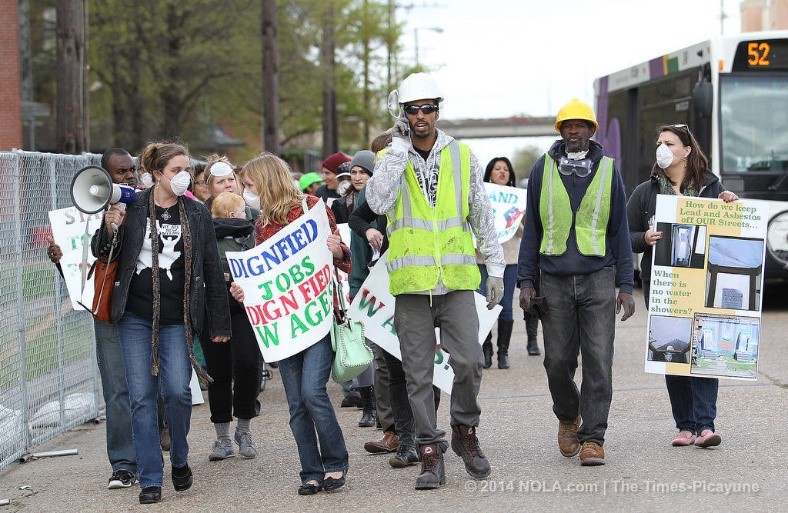
Two workers, one of whom was a previous ECWTP trainee, along with labor advocacy groups led a series of protests related to poor work conditions and pay at the demolition site. Within a few months, inspectors from the Occupational Safety and Health Administration (OSHA) visited the site and reported more than a dozen serious safety violations related to the handling of hazardous materials at the Iberville redevelopment site. The four companies who employed workers at the site were cited for violations, including failure to provide proper decontamination facilities and proper safety equipment for job sites contaminated with lead and asbestos.
“In this situation, these young men applied what they learned in terms of occupational health and safety,” said Wright. “If you want to evaluate the program, the fact that they walked off the job due to fear of being exposed tells you that we did a good job. And that is a success.”
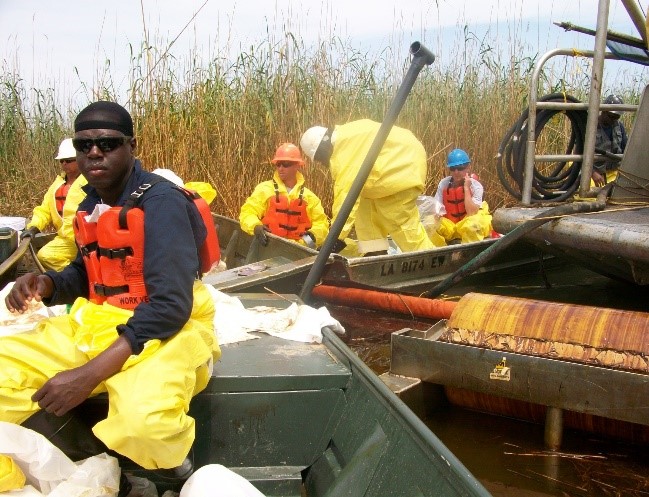
Because of economic pressures and devastating disasters, the Consortium has evolved its approach for training target populations.
“We’ve watched the program go from responding to the need of cleaning up Superfund sites and landfills to responding to the critical needs of these communities,” said Wright. “We’ve expanded our curricula over time to represent changes going on in the environment, and have responded to nearly every major disaster, from Ebola, to hurricanes, and now the coronavirus.”
McClue said these experiences have helped the Consortium become more proactive versus reactive in training. “We’re now more training-ready, capable to respond to any type of health and safety incident that may occur in the future,” he said. This training readiness is evidenced by the Consortium’s response to the Deepwater Horizon Gulf Oil Spill as well as Hurricane Katrina.
Shortly after the Gulf Oil Spill, a call went out for people who had experience in oil spill response and training. McClue and other staff took the training course, and as a result, they were able to offer training for workers to help with cleanup of materials contaminated by oil. The Consortium’s ECWTP trainees became the most sought after workers because of their completion of the 40-hour HAZWOPER training required under the U.S. Environmental Protection Agency’s contingency oil response plan, along with some cleanup experience. Many trainees were put into supervisor positions on oil spill jobs, making twice as much as the regular oil spill worker.
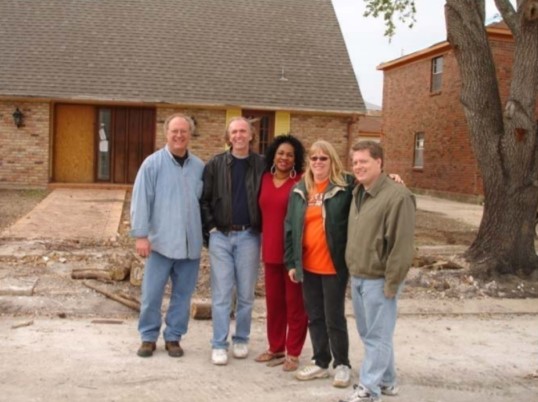
In response to Hurricane Katrina in 2005, the Deep South Center for Environmental Justice partnered with the United Steelworkers and others on “A Safe Way Back Home,” a community remediation project aimed at helping residents in a New Orleans neighborhood with cleanup and restoration of their flooded community. This multidimensional project involved safety training, volunteer assistance, and topsoil removal. The project welcomed hundreds of volunteers from churches, universities, government programs, and non-profit organizations.
Wright said the project was a huge success. The project helped build a sustainable community giving residents a means to return home safely and quickly. It also provided an opportunity for ECWTP trainees who were trained in mold remediation to get employed. “It was a great experience that had community-wide impact,” Wright said. “In recognition, our program received numerous awards including the Robert Wood Johnson Community Leader Award.”
In the midst of the COVID-19 pandemic, the HBCUC has made the switch to online and virtual training. This paradigm shift is made possible through Facebook, YouTube, and Zoom conferencing, which has allowed the HBCUC to reach more communities with vital health and safety training. For example, it has allowed the Consortium to provide training for essential workers and many vulnerable populations. In support of this changed environment, staff have created virtual training classrooms and are re-designing current classroom space to accommodate physical distancing. They are in the final stages of production for a COVID-19 educational video which will be hosted on the DSCEJ’s YouTube channel.

J. Kelly is a remarkable 25-year-old young man. He was bound for success. He played high school football and ran track at Southern University New Orleans. Life threw him some curves and as a result he fell upon hard times. Kelly did not graduate from college and meaningful employment was not to be had. He learned about the ECWTP from a previous graduate and decided to apply. Kelly was determined to complete the program and he demonstrated that nothing would stand in his way, not even homelessness. He actually lived in his fiancé’s automobile until his old coach from the university gave him a key to the gym so he could wash-up and get some sleep. Kelly’s attendance was good though he was late sometimes. He did very well in his classes and obtained all certifications.
Kelly received the Survivor Award at the virtual graduation. Because of his determination and hard work, he was one of the first graduates to obtain employment. He accepted a permanent position with Battelle CCDS in Columbus as a COVID-19 Response PPE Decontaminator. They use a Critical Care Decontamination SystemTM to address the current shortage of critical personal protective equipment across the U.S. Kelly is now earning $25 dollars an hour with full benefits. He along with his fiancé and baby have a wonderful new start in life. Kelly credits the Deep South Center for Environmental Justice along with staff, instructors, and counselors for supporting and preparing him to obtain this wonderful opportunity.
to Top


